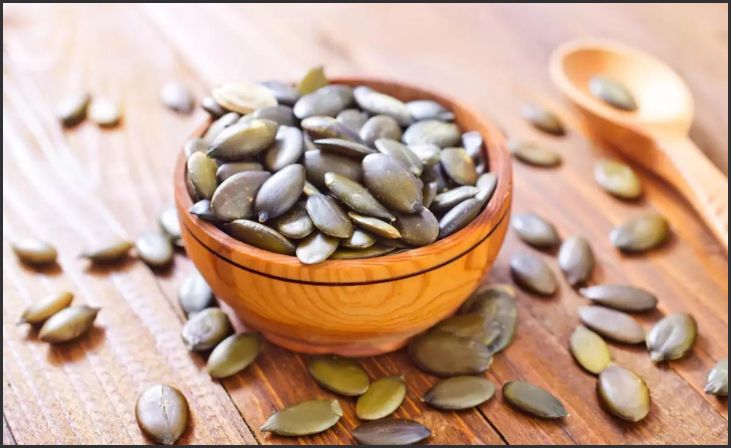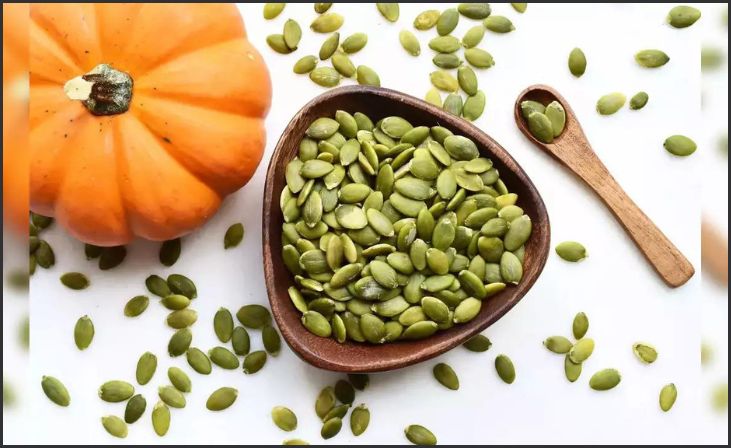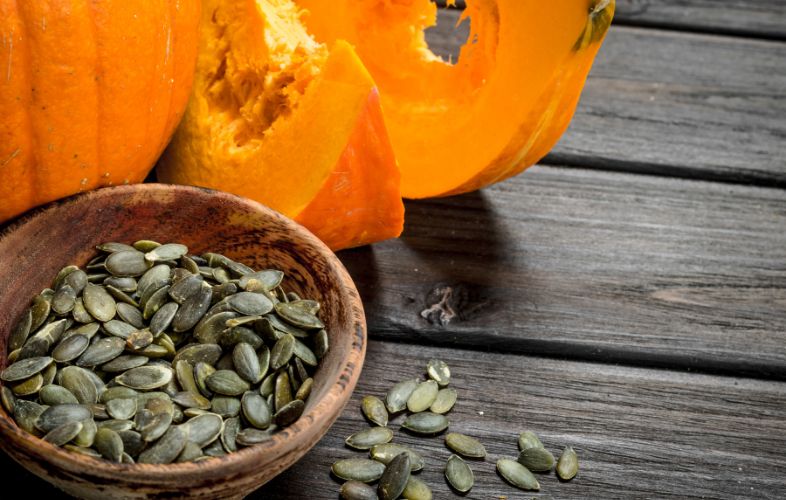Pumpkin seeds, often overlooked, pack a powerful punch in promoting overall health. Rich in essential nutrients such as protein, omega-3 fatty acids, and a plethora of vitamins and minerals, these small wonders offer a myriad of benefits.
Throughout history, diverse cultures have recognized and utilized the nutritional prowess of pumpkin seeds. This article explores the health advantages associated with their consumption, ranging from cardiovascular well-being and immune system support to mental health benefits.
Unveiling the nutritional composition of pumpkin seeds, we delve into their potential impact on prostate health, bone density, and even weight management. As we navigate the intricate interplay of elements within these seeds, the aim is to shed light on their remarkable role in fostering a holistic approach to well-being.
Health benefits of consuming pumpkin seeds
Nutrient-Rich
Pumpkin seeds are nutrient-rich, offering a diverse range of health benefits. Packed with magnesium, zinc, copper, and manganese, they support heart health, regulate blood pressure, and provide antioxidants for cell protection.
The seeds contain tryptophan, aiding in better sleep, and their anti-inflammatory properties may reduce inflammation.
With potential benefits for prostate health, blood sugar regulation, and digestive health due to fiber content, pumpkin seeds also contribute to immune support through zinc. Including these seeds in your diet provides a delicious and convenient way to enhance overall nutrition and well-being.
Also, Read – Pumpkin-Themed Wedding Decor Ideas
Heart Health

Pumpkin seeds promote heart health by delivering essential nutrients like magnesium, vital for regulating blood pressure and supporting cardiovascular function. Rich in antioxidants such as carotenoids and vitamin E, they combat free radicals that can damage heart cells.
The seeds’ magnesium content also contributes to improved sleep quality. Including pumpkin seeds in your diet not only provides a tasty snack but may positively impact heart health, making them a valuable addition to a balanced and heart-friendly nutritional regimen.
Rich in Antioxidants
Pumpkin seeds boast a wealth of antioxidants, including carotenoids and vitamin E, conferring powerful health benefits. These antioxidants combat oxidative stress, shielding cells from damage caused by free radicals.
The carotenoids in pumpkin seeds, such as beta-carotene, promote eye health and overall well-being. Additionally, vitamin E’s protective properties contribute to skin health and immune function.
By incorporating pumpkin seeds into your diet, you harness their antioxidant richness, supporting your body’s defense against oxidative damage and enjoying a delicious, nutritious snack that contributes to your overall health and vitality.
Improved Sleep
Pumpkin seeds aid in improved sleep due to their tryptophan content, a precursor to the sleep-inducing neurotransmitter serotonin. Tryptophan is converted into serotonin, which, in turn, can be converted into melatonin, a hormone regulating the sleep-wake cycle.
Consuming pumpkin seeds may contribute to better sleep quality and help alleviate insomnia or sleep disturbances.
Incorporating these seeds into your diet can be a natural and delicious way to promote relaxation and enhance sleep, making them a valuable addition for those seeking a holistic approach to improving their overall sleep patterns.
Prostate Health
Pumpkin seeds play a role in supporting prostate health. Studies suggest that compounds in these seeds may have a protective effect on the prostate gland, potentially reducing the risk of prostate issues.
The seeds contain zinc, a mineral crucial for prostate function and overall reproductive health. Additionally, the anti-inflammatory and antioxidant properties of pumpkin seeds may contribute to maintaining a healthy prostate.
Including pumpkin seeds in your diet can be a proactive measure for men’s health, offering a tasty and convenient way to support the well-being of the prostate and reduce the risk of associated conditions.
Also, Read – Pumpkin varieties for making homemade pies
Reduced Inflammation

Pumpkin seeds contribute to reduced inflammation in the body, thanks to their rich antioxidant content. Antioxidants, such as carotenoids and vitamin E, counteract oxidative stress and inflammation by neutralizing free radicals.
The anti-inflammatory properties of pumpkin seeds may benefit various bodily systems, potentially lowering the risk of chronic diseases associated with inflammation. Incorporating these seeds into your diet offers a natural and flavorful approach to supporting overall health and well-being.
By mitigating inflammation, pumpkin seeds serve as a valuable addition to an anti-inflammatory lifestyle, promoting a balanced and resilient physiological state.
Blood Sugar Regulation
Pumpkin seeds contribute to blood sugar regulation, primarily due to their magnesium content. Magnesium plays a crucial role in insulin function and glucose metabolism, helping maintain stable blood sugar levels.
By supporting insulin sensitivity, pumpkin seeds may reduce the risk of insulin resistance and type 2 diabetes. The seeds’ fiber content further aids in slowing down the absorption of sugar, promoting steady blood sugar levels.
Including pumpkin seeds in your diet provides a delicious and nutritious way to support overall metabolic health, making them a valuable addition for those looking to manage and prevent fluctuations in blood sugar.
Digestive Health
Pumpkin seeds promote digestive health with their rich fiber content, aiding in regular bowel movements and preventing constipation. The dietary fiber supports a healthy digestive tract by promoting the growth of beneficial gut bacteria.
Additionally, the seeds contain antioxidants that may contribute to overall gastrointestinal well-being by reducing inflammation. Incorporating pumpkin seeds into your diet provides a convenient and tasty way to support digestive function.
Whether eaten on their own or added to meals and snacks, these seeds offer a natural and nutritious solution for those seeking to maintain a healthy and efficient digestive system.
Immune Support
Pumpkin seeds provide immune support through their zinc content, a mineral vital for immune function. Zinc contributes to the production and activation of immune cells, helping the body defend against infections and illnesses. Including pumpkin seeds in your diet offers a convenient way to ensure adequate zinc intake, supporting overall immune health.
The seeds’ antioxidant properties also play a role by combating free radicals and reducing oxidative stress, further bolstering the immune system.
By incorporating pumpkin seeds into your meals or enjoying them as a snack, you enhance your nutritional profile and fortify your body’s natural defenses, contributing to a resilient and robust immune response.
Mood Enhancement

Pumpkin seeds may contribute to mood enhancement, thanks to their magnesium content and other nutrients. Magnesium is essential for neurotransmitter function, including serotonin production, which plays a crucial role in mood regulation.
Consuming pumpkin seeds provides a natural source of this vital mineral, potentially contributing to feelings of well-being and relaxation. Additionally, the seeds contain other mood-supporting nutrients, such as tryptophan, known for its role in serotonin synthesis.
By incorporating pumpkin seeds into your diet, you not only enjoy a delicious and convenient snack but also nourish your body with elements that may positively influence mood, promoting a sense of calm and emotional balance.
Conclusion
In conclusion, incorporating pumpkin seeds into your diet can be a simple yet effective way to enhance your overall health. With their rich nutritional profile and diverse benefits, from supporting heart and prostate health to bolstering the immune system and promoting mental well-being, these seeds stand out as a nutritional powerhouse. Embrace the small but mighty pumpkin seed as a delicious and versatile addition to your meals, mindful of the transformative impact it can have on your holistic well-being.
FAQs
The omega-3 fatty acids in pumpkin seeds can help lower cholesterol levels, reducing the risk of cardiovascular diseases. Additionally, the magnesium and potassium content supports blood pressure regulation and overall heart function.
Yes, pumpkin seeds are high in zinc, which plays a crucial role in supporting prostate function and may help reduce the risk of prostate-related issues.
Pumpkin seeds contain antioxidants that help neutralize free radicals, strengthening the immune system. The presence of zinc also enhances the production of immune cells.

Leave a Reply